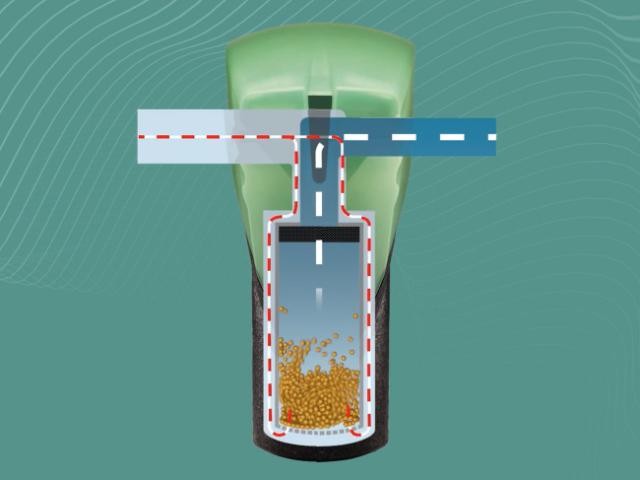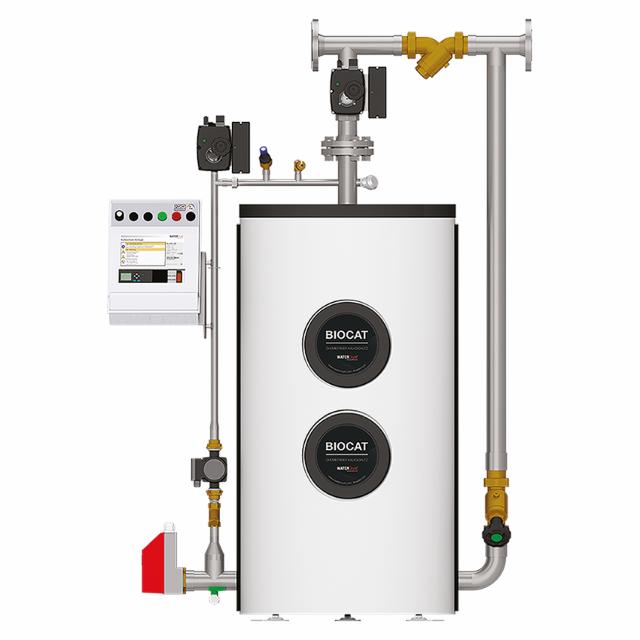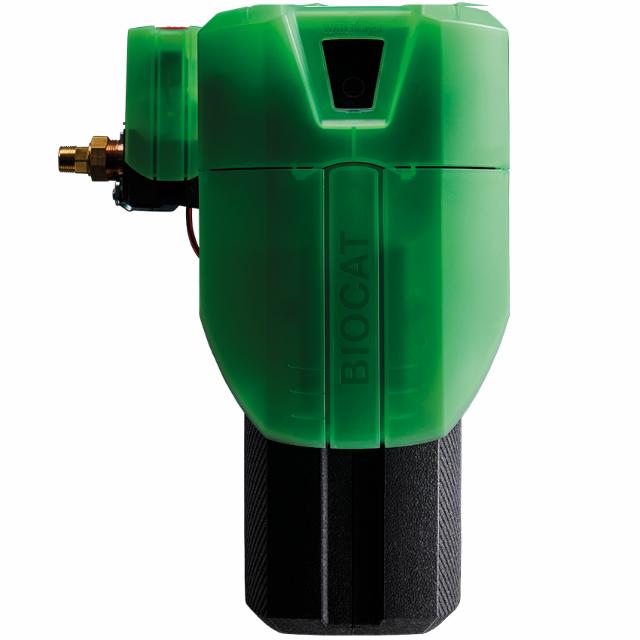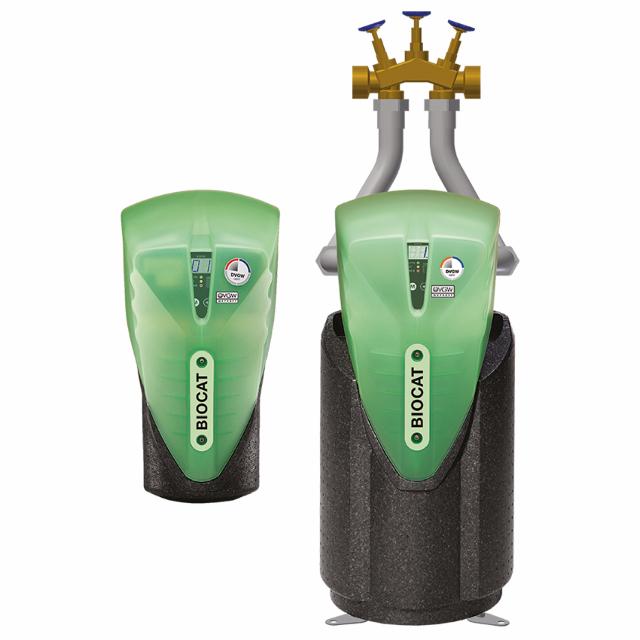The Future of Limescale Protection
Limescale in water can be a major challenge for businesses, housing associations, hotels, and other buildings with high water consumption. Have you experienced limescale deposits in pipes, heat exchangers, or boilers? Or are you aware of how costly it can become if limescale is allowed to build up over time?

Do you struggle with limescale deposits?
Be prepared and protect your installations

Limescale causes operational disruptions, reduces efficiency, and leads to increasing maintenance costs. Hard water can be a hidden expense that slowly eats away at your budget if it is not dealt with in time.
Why is limescale a problem?
Limescale deposits reduce heat transfer in water heaters and heat exchangers, which can result in a significant increase in energy consumption. Did you know that just 1 mm of limescale buildup can increase energy costs by up to 10%? For businesses and property complexes, this quickly adds up to considerable extra expenses.
In addition, limescale shortens the lifespan of technical installations, leading to more frequent repairs and replacements. Unplanned downtime can be costly, especially in industries where reliable operations are crucial.
BIOCAT – Effective and Eco-Friendly Limescale Protection
Do you want to prevent limescale problems without using chemicals or salt? With the BIOCAT limescale protection system, you can ensure that limescale does not adhere to your installations. The technology uses natural biomineralization, allowing minerals to remain in the water but without forming harmful deposits. This means fewer operational disruptions, lower energy consumption, and reduced maintenance costs.
Take control of limescale – contact WATERCryst today
Do you want to avoid unnecessary costs and protect your installations? Contact us for a non-binding consultation on how BIOCAT can make a difference for you. Let us help you optimize operations and reduce energy and maintenance expenses!
Advantages of BIOCAT limescale protection:
- Saves energy and reduces operating costs
- Extends the service life of pipes, boilers and heat exchangers
- Minimises maintenance and downtime
- Environmentally friendly solution without chemicals or salt
- Preserves the natural taste and composition of drinking water
Maintenance-free for five years
Regardless of water consumption, the systems are maintenance-free for five years, after which the catalyst granulate must be replaced. There is no need for assistance from technicians or service personnel during operation, and there is no need to refill or store operating materials.
Patented catalyst technology
WATERCryst systems are based on our patented catalyst technology, which ensures that the value of the entire drinking water system is maintained and meets technical and normative standards. This applies regardless of the scale of your project - and whether the installation is in single-family homes, housing associations, commercial or public buildings.
Limescale protection with high drinking water quality and energy efficiency
The cost-effective BIOCAT systems are suitable for industry, hotels, residential complexes, and apartment blocks, among others, where they protect installations and technology from limescale damage and ensure high drinking water quality and energy efficiency through natural limescale protection.
Preserving healthy limescale and natural flavor
BIOCAT limescale protection systems are characterized by the fact that they remove the bad properties of limescale from drinking water - while preserving the natural and healthy limescale content. In this way, BIOCAT systems ensure, that drinking water retains its good, natural flavor.

CERTIFICATIONS
The reliable, safe, and durable solution
BIOCAT limescale protection systems are certified by independent institutions and meet high technical standards:
The DVGW certification LS 25-C, KS/KLS 3000 and 4000 to KS 5D guarantees safety, reliability, and quality through comprehensive testing, including functionality and durability.
The ÖVGW certification guarantees drinking water safety with a focus on material selection, hygiene, and quality control.
Read more about our certifications here.
MODE OF OPERATION
Patented catalyst technology - inspired by nature's method
BIOCAT systems work with a patented catalyst technology inspired by biomineralization - nature's way of forming calcium crystals. The technology works via a catalyst granulate that, with its special surface, can form microscopic crystals from the limescale dissolved in the water. These crystals are constantly flushed out with water withdrawals, preventing limescale deposits from forming in drinking water installations, for example.

HYGIENE
Clean and chemical-free drinking water for everyone
Limescale deposits create a biofilm that provides a breeding ground for bacteria and promotes legionella growth, among others. With BIOCAT, the drinking water system is effectively protected against limescale - and the integration of chemical-free limescale protection helps to maintain drinking water hygiene and good drinking water quality.
Always clean drinking water for everyone
BIOCAT limescale protection systems ensure compliance with the Drinking Water Ordinance and the minimization requirement so that drinking water is pathogen-free, clean, and fit to drink always. The certification company DVGW Cert GmbH ensures that each system fulfills all legal and normative requirements in all essential respects - and that they always remain compliant.
BIOCAT systems fulfill all legal requirements:
- Drinking Water Ordinance
- Pressure Equipment Directive
- Machinery Directive
- Low Voltage and EMC Directive
- At least compliance with generally recognized technical rules and standards
- Certified solutions
The certification program for issuing a DVGW-type examination certificate for lime protection systems according to DIN 1988-200 includes several essential requirements and tests in terms of performance, technical safety, documentation, and continuous quality control, among other things.
WATERCryst delivers both economically and environmentally sustainable solutions
More than 100.000 systems throughout Europe
CASES
CAPACITIES
Scalable limescale protection solutions - from single-family homes to industry and housing associations
BIOCAT limescale protection systems are available in various sizes with different capacities. From the smallest systems suitable for single-family homes up to the largest systems that can cover the needs of industry and entire housing associations.
When a large-scale solution is needed for a holiday park with a water park, for example, the systems can be connected in series for virtually infinite capacity - without the need for huge amounts of salt.
When a large-scale solution is needed, for example for a holiday park with a water park, the systems can be connected in series and thus have a virtually infinite capacity - without using enormous amounts of salt.




